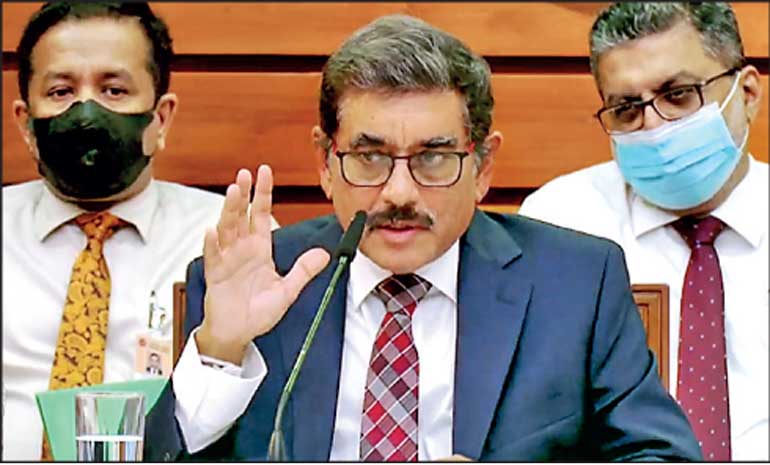Tuesday Feb 17, 2026
Tuesday Feb 17, 2026
Saturday, 30 April 2022 01:23 - - {{hitsCtrl.values.hits}}
 Central Bank Governor Dr. Nandalal Weerasinghe gestures during the briefing to the media yesterday
Central Bank Governor Dr. Nandalal Weerasinghe gestures during the briefing to the media yesterday
The Government is to ban imports via “Open Account” in a move to curb the illegal forex market which finances the former, the Central Bank announced yesterday.
The relevant Gazette in this regard will be out over the weekend. An open account transaction is a sale where the goods are shipped and delivered before payment is due, which in international sales is typically in 30, 60 or 90 days.
Central Bank Governor Dr. Nandalal Weerasinghe told journalists yesterday that going forward imports will be allowed only on the basis of Letters of Credit (LCs), Documents against Payment (DP) or Documents against Acceptance (DA) terms. Any imports other than these three methods will not be cleared by the Customs. About 20% of imports come via Open Account terms.
The move, according to the Governor, will help curtail the grey forex market as well as unofficial remittance channels such as Hawala or Undiyal which is a source to finance imports made in Open Account method. It was pointed out that given the demand for forex by those engaged in Open Account imports, the grey market thrived with help from Hawala/Undiyal channels. This also encourages a higher premium for foreign currency via this option.
Whilst noting that the premium or the gap between rates offered by formal banking channels and grey market is reducing, Dr. Weerasinghe said the latest measure will minimise it further.
More importantly, ban of Open Account transactions will also help reduce unnecessary imports. Due to ongoing initiatives, imports in March had reduced to $ 1.7 billion from $ 2 billion in December whilst the Central Bank hopes new measures will help it to be reduced to $ 1.5 billion.
Though noting that there was a degree of overshooting of the currency or that it is overvalued, CBSL Chief urged migrant workers to channel their remittances via official banking channels.
“Following the flexible exchange rate policy initiated recently inward remittances will fetch proper value, hence there is no need to send money back home via Hawala/Undiyal channels,” Dr. Weerasinghe said.
“If Lankans overseas are concerned about their country’s situation and the plight of the people, the bigger responsibility and show of support is sending money to their families via the official banking channels. This will help the nation and boost reserves to import essentials,” CBSL Governor said.
He recalled that the country used to get $ 500 million monthly and $ 7 billion annually in the past in the form of workers’ remittances and helping the Balance of Payments. He dismissed the perceptions that sending money via official channels gets squandered by the Government and stressed that such a course will only help their families whilst benefiting the nation.
Governor also said that to curb the grey market, banks have been directed to offer foreign exchange for the purpose of overseas education and emergency medical and healthcare needs. He noted that these requirements are much smaller such as $ 5,000 or $ 10,000 and if needed the Central Bank will help the banks in meeting this need.
Weerasinghe also said that the rupee will stabilise in a flexible exchange rate environment with on-going measures similar to interest rates coming down after overshooting following the tightest monetary policy action earlier last month.